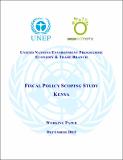| dc.description.abstract | A recent green economy assessment report (UNEP, 2014) on Kenya reveals that the transition to a green economy can deliver important benefits, such as long-term economic growth, a cleaner environment and high productivity. The report also indicates that green fiscal policies, which include a range of tools such as taxes, subsidies, user charges and fees, and public expenditure, can be useful in supporting this transition.
Kenya is already using various green fiscal policy tools in sectors such as forestry, energy, water, wildlife, mining and fisheries. For example, key fiscal instruments in the energy sector include electricity tariffs and
levies, feed-in tariffs, a road maintenance levy, excise tax, import duties, VAT exemptions and investment
through the Geothermal Development Company (GDC). Kenya has a special levy on fuel which is used to
finance the development of road infrastructure through the Kenya Roads Board (KRB). Kenya’s electricity tariff is designed to achieve cost recovery and is based on an increasing block tariff (IBT) pricing scheme. With support from the World Bank, Kenya is connecting residents in slums and low-income rural areas to the national grid at a subsidized charge. Many private investors have also shown interest in investing in renewable energy through the feed-in-tariff scheme. Kenya has commercially viable quantities of coal and oil, and according to the IMF (2014) Kenya could start oil production in three to five years. The Government has drafted a Sovereign Wealth Fund Bill 2014 which will establish a Kenya National Sovereign Wealth Fund (KNSWF) for recently discovered reserves
of oil and other minerals. The draft bill provides for the establishment of a Stabilization Fund, Infrastructure and Development Fund, and a Future Generations Fund. The purpose of the latter is to help build savings, invest in sectoral transformation and environmental protection. Medium- and long-term investment by this fund can be useful in supporting green economy objectives. | en |

